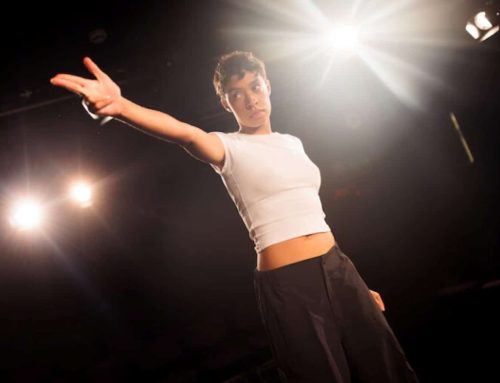Emmy, Grammy, and Tony Award-winning singer, actor, and all-around icon Billy Porter is having a busy 2025. Fresh from four months as the Emcee in the West End revival of Cabaret, a role he is set to reprise on Broadway from July, he has found time to direct. Writer Harrison David Rivers’ tragic love story, This Bitter Earth, may seem an unexpected choice for someone so closely associated with the musical theatre genre, particularly since the play enjoyed a handsomely directed run at The White Bear Theatre barely two years ago.
Porter brings out the humour and suffuses the piece, which is set against the backdrop of extrajudicial killings of black men throughout the USA, with a haunting undertone of urban threat. But the central flaw in This Bitter Earth remains: the relationship at its heart struggles to convince.
African American Jesse (Omari Douglas) is a hard-up student from the Deep South with a conservative Baptist upbringing, a prestigious scholarship to Columbia University, and a “burgeoning writing-slash-teaching career” to worry about. “I know my history, I’ve seen Eyes On The Prize”, Jesse tells us, but a cautious determination to live life on his terms is as activist as he is going to get.
Neil (Alexander Lincoln) is a jockish, white, trust-fund nepo baby with uber-liberal parents and a roving eye. The lad’s progressive East Coast education wakes him to his monumental white privilege and spurs a growing interest in African American poets and activism for the Black Lives Matter movement. Ditching an unwanted career in investment banking (“I only took it because of my Mum”, he explains), he gets angry, grabs a megaphone, and sets about “doing whatever needs doing”.
A chance encounter at a demo and some fortuitous Facebook stalking leads to a drunken date and the beginnings of a long-term, if bumpy, love story between the two. Rivers’ non-linear storyline charts the turbulent affair over 3½ years in Minnesota. Will the lads manage the complex challenges of making their relationship work across political, racial, cultural, and class boundaries? A shocking, well-camouflaged twist in the tale reminds us that homophobia is as much of a threat to mixed-race gay couples as racism.
Both men are, at one level, interlopers in an unfamiliar realm, which at least gives them a common cause. Douglas impresses with a nuanced, layered turn as the writer whose journey involves a slow-burning recognition that the personal is always political. The obvious chemistry between the leads, underscored by a plethora of enjoyable kissing, conveys ardent passion. Nevertheless, one wonders throughout whether the mash-up of Neil’s white guilt and Jesse’s apathy offers a credible basis for the odd-couple relationship that Rivers serves up. One also wonders whether Neil really would have neglected to mention his new boyfriend was a hard-up black academic before bringing him home to visit his Upper East Side parents.
Jesse confesses he has only ever dated white men because, in his estimation, black men, constantly under threat, have never learned how to be gentle. Yet Lincoln’s portrayal of Neil delivers a masculine mountain man driven by fissile fury at the injustices of the world. He rarely has time to be soft. “Gentle gets you killed”, he shouts, too angry most of the time to be tender. What does Jesse see in him, then? One also wonders whether Jesse’s barbs about a “busload of guilty white people” might pique Neil more than they do. By the end, Jesse reaches an epiphany of sorts, although not for the reasons you might suppose.
Porter finds and mines the comic moments, adding light and shade to what is, in essence, a tragedy. Morgan Large’s black box set, lit by horizontal and vertical neon edging, gives the piece an urban vibe that impresses, though it feels a little more New York than leafy Minnesota. Back projection brings subway cars, bars, clubs, greyed-out skyscrapers, and threatening city streets to life. Julian Starr’s hostile soundscape impresses, too, though it can be intrusive in scenes where intimacy would serve the storyline better.
This Bitter Earth was written in the run-up to Trump’s first term and remains as relevant now as it was then. The idea feels fresh, even if the love affair, much as one cheers it on, feels a little unreal.
Writer: Harrison David Rivers
Director: Billy Porter
New – Online Shop!
My collected theatre reviews now available in paperback format for the years 2022 and 2023.
Just £10 per copy.
Over 100 reviews in each book.
- John Cutler’s Collected Theatre Reviews – Volume One. 2022. Paperback. 296 pages. ISBN 9781805179757. £10
-
John Cutler’s Collected Theatre Reviews – Volume Two. 2023. Paperback. 284 pages. ISBN 9781836884170. £10
Visit my Online Shop or click on Buy Now to order your copies.
More Recent Reviews
The Sea Horse. Golden Goose Theatre.
The Sea Horse, Edward J Moore’s grim slice of mid-century realism, debuted to solid reviews off-Broadway in 1974. Since [...]
Garry Starr: Classic Penguins. Arts Theatre.
Emperor penguins’ shortish treks between sea and nesting sites are about as peripatetic as your average Thameslink commuter. Garry [...]
When the Clarion Came to Call. Cockpit Theatre.
When, upon entering an auditorium, you are told, ‘Take as many pictures as you like, but mind the ceramics,’ [...]








